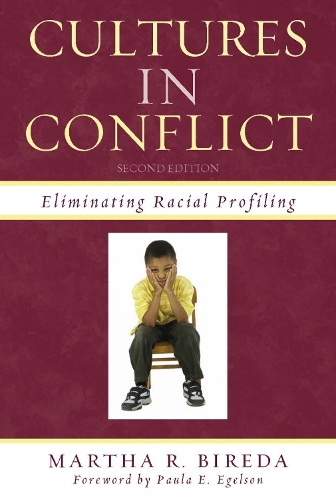
Cultures in Conflict: Eliminating Racial Profiling
(Paperback, Second Edition)
Publishing Details
Cultures in Conflict: Eliminating Racial Profiling
By (Author) Martha R. Bireda
Bloomsbury Publishing PLC
Rowman & Littlefield Education
16th January 2010
Second Edition
United States
Classifications
Tertiary Education
Non Fiction
Ethnic groups and multicultural studies
370.117
Physical Properties
Paperback
106
Width 154mm, Height 230mm, Spine 9mm
200g
Description
The suspension and expulsion of ethnic minority students, especially African American males , remains a critical issue in schools today. This book addresses the root causes of racial disparity in discipline. Dr. Bireda shows how culturally conditioned beliefs and cultural misunderstanding negatively impact teacher-student relationships and interactions in the classroom. In addition, factors in the school climate that may precipitate and escalate disciplinary events are examined. Ultimately, Cultures In Conflict provides a framework which assists administrators and teachers in establishing a dialogue on issues related to race and culture, and provides a set of strategies for reducing disciplinary events and referrals.
Reviews
Biredas unique insights into student culture and its impact on teaching and learning are powerful and beneficial to those who desire to reach all children. We used her book as a springboard to jumpstart a conversation about race and culture and the instructional decisions we must make to be sure that every child reaches his or her fullest potential. I would highly recommend Cultures in Conflict to any faculty that is serious about embracing students from diverse backgrounds and pushing them to new heights. -- Christopher D. Swetckie, principal, McClellanville Middle School, SC
I could not put Cultures in Conflict down until I consumed the words Bireda had written. I decided to put her suggestions to the test with my predominately African American seventh graders. What a difference it has made in my attitude as well as those of my students. For the first time in my career, I was aware of something called cultural etiquette. By following that etiquette, I was better able to interact with my students, especially in conflict situations. -- Susan Peeler Wood, teacher, McClellanville Middle School, SC
In this new edition, Bireda engages educators in a dynamic, highly informative discussion on the cultural conflicts that occur between students of color and teachers. Her depth of knowledge and expertise regarding cultural communication styles of African American and Latino students is clearly illustrated. High praise to Bireda for providing effective strategies aimed at enhancing strong relationship building and optimizing learning opportunities for students experiencing achievement gaps. -- Lisa M. Black, special assistant to the superintendent for race and equity, Madison, WI
Since the initial publication of Martha R. Biredas book in 2002, there has been an unprecedented increase in African American students who are disadvantaged due to harsh discipline measures such as school expulsions and suspensions. The author provides recommendations for educators and follows each chapterincluding chapters on the damaging influence of No Child Left Behind law and zero tolerance policieswith a list of critical questions to ponder ones own school. The research and issues presented in this book are applicable to almost any setting, especially those in which cultural friction and racism persist. I highly recommend this book as a tool for equality in educationa paramount goal the United States educational system has not yet reached. -- Marsha Postrozny, associate professor, Guam Community College
Martha Bireda brings a fresh perspective to the school culture debate by combining theory and practical experience in the revised edition of Cultures in Conflict. Her in-depth analysis of the problem plus her practical advice make this book a must-have for every educator in the country. -- Paula Egelson, director, Center for Partnerships to Improve Education, College of Charleston
Biredas work is particularly cogent in its assessment of school-related factors that drive the disproportionate number of discipline referrals for African American males. Teachers will find the principles of cultural etiquette quite salient and relevant to the practice of cultural pedagogy. Biredas book is timely, as schools face the challenges of meeting the requirements of No Child Left Behind and educating citizens for a global society. -- Willette Nash, curriculum and instructional specialist, Winston-Salem Forsyth County Schools, North Carolina
Author Bio
Martha R. Bireda has been an educational consultant for twenty years, specializing in racial disparity in discipline and the racial achievement gap.
